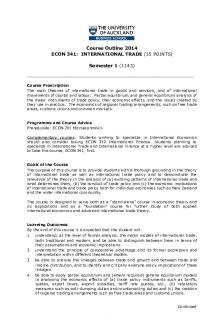Bbb4m international business course outline 2015 PDF

| Title | Bbb4m international business course outline 2015 |
|---|---|
| Course | International Business |
| Institution | High School - Canada |
| Pages | 2 |
| File Size | 147.5 KB |
| File Type | |
| Total Downloads | 39 |
| Total Views | 171 |
Summary
Comprehensive notes from Mr. Zapfe ...
Description
RICHVIEW COLLEGIATE INSTITUTE PROGRAM AREA: Business
Course: International Business Fundamentals
COURSE CODE: BBB 4M
Grade/Level: 12 University/College Preparation
RECOMMENDED PREREQUISITE: Any University/ College course in Business Studies or Canadian/ World Studies
Credit Value: 1.0
CONTACT:
Mr. Zapfe, Phone: 416-394-7980 extension 20105, E-mail: [email protected] Website: [email protected]
Textbook:
Guest & Notman, Fundamentals of International Business – A Canadian Perspective, Thompson, 2010
Cost of Textbook:
$90 (if lost or damaged)
Additional Resources: None
COURSE DESCRIPTION:
This course provides an overview of the importance of international business and trade in the global economy and explores the factors that influence success in international markets. Students will learn about the techniques and strategies associated with marketing, distribution, and managing international business effectively. This course prepares students for postsecondary programs in business, including international business, marketing, and management. CURRICULUM STRANDS (UNITS) and OVERALL EXPECTATIONS: Unit 1 - Business, Trade and the Economy Demonstrate an understanding of terminology, concepts, and basic communication practices related to international business; Analyse the impact of international business activity on Canada’s economy; and Demonstrate an understanding of how international business and economic activities increase the interdependence of nations. Unit 2 - The Global Environment for Business Analyse ways in which Canadian businesses have been affected by globalization; Demonstrate an understanding of the factors that influence a country’s ability to participate in international business; and Assess the effects of current trends in global business activity and economic conditions. Unit 3 - Factors Influencing Success in International Markets • Analyse the ways in which cultural factors influence international business methods and operations; • Assess the ways in which political, economic, and geographic factors influence international business methods and operations; • Identify and describe common mistakes made by businesses in international markets; • Evaluate the factors currently affecting the international competitiveness of Canadian businesses.
Unit 4 - Marketing Challenges and Approaches, and Distribution
• • •
Assess the challenges facing a business that wants to market a product internationally; Compare the approaches taken by various companies to market their products internationally; Demonstrate an understanding of the logistics of, and challenges associated with, distribution to local, national, and international markets
Unit 5 - Working in International Markets • Analyse the ways in which ethical considerations affect international business decisions; • Assess the working environment in international markets;
•
Demonstrate an understanding of the process for crossing international borders as it relates to international business.
Assessment and Evaluation Assessment and Evaluation are based on the expectations and levels of achievement outlined in the provincial curriculum document for each subject. A wide range of assessment and evaluation opportunities allows students to demonstrate their learning in a variety of ways. This information provides the basis for reporting student grades on the Provincial Report Card. A final mark will be calculated using the following categories or strands. 70% of the final mark will be based on evaluations conducted throughout the course All four achievement categories/strands do not need to be evaluated in each evaluation task. Communication (25%) Business Practices In Class Work Presentations
Knowledge/Understanding (25%) Tests/Quizzes Assignments
Thinking and Inquiry (25%) Tests/Quizzes Assignments
Application/Making Connections (25%) Assignments Case Studies Summative Application Exam
30% of the final mark will be based on a final evaluation in the form of culminating activities Components of Summative Evaluation:
Case study Project presentation
15% 15%
** A detailed explanation of the culminating activity will be distributed to students in the class. Learning Skills: The report card provides a record of the learning skills, demonstrated by the student in every course in the following six categories: Responsibility, Independent Work, Initiative, Organization, Collaboration, Self-Regulation. The learning skills are evaluated using a four-point scale (E-Excellent, G-Good, S-Satisfactory, N-Needs Improvement).
Please refer to the Student Agenda Planner for details regarding the Achievement Chart and Learning Skills.
It is Imperative that all students adhere to “Richview’s Evaluation Policy” regarding their 70% Term Work and 30% Culminating Activities....
Similar Free PDFs

Business IT Course Outline
- 6 Pages

Business Law Course Outline
- 5 Pages

International Business
- 58 Pages

International Business
- 76 Pages

International Business
- 131 Pages

International Business
- 1 Pages

International Business
- 11 Pages

Course Outline
- 13 Pages

Course Outline
- 26 Pages

Course Outline
- 13 Pages
Popular Institutions
- Tinajero National High School - Annex
- Politeknik Caltex Riau
- Yokohama City University
- SGT University
- University of Al-Qadisiyah
- Divine Word College of Vigan
- Techniek College Rotterdam
- Universidade de Santiago
- Universiti Teknologi MARA Cawangan Johor Kampus Pasir Gudang
- Poltekkes Kemenkes Yogyakarta
- Baguio City National High School
- Colegio san marcos
- preparatoria uno
- Centro de Bachillerato Tecnológico Industrial y de Servicios No. 107
- Dalian Maritime University
- Quang Trung Secondary School
- Colegio Tecnológico en Informática
- Corporación Regional de Educación Superior
- Grupo CEDVA
- Dar Al Uloom University
- Centro de Estudios Preuniversitarios de la Universidad Nacional de Ingeniería
- 上智大学
- Aakash International School, Nuna Majara
- San Felipe Neri Catholic School
- Kang Chiao International School - New Taipei City
- Misamis Occidental National High School
- Institución Educativa Escuela Normal Juan Ladrilleros
- Kolehiyo ng Pantukan
- Batanes State College
- Instituto Continental
- Sekolah Menengah Kejuruan Kesehatan Kaltara (Tarakan)
- Colegio de La Inmaculada Concepcion - Cebu





